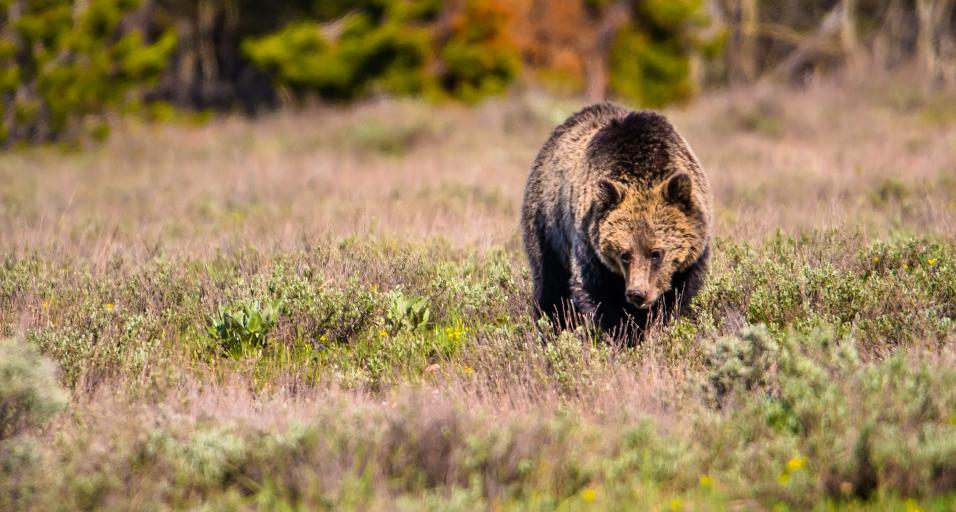News
Be bear aware when archery hunting

After months of planning, it’s finally hunting season for some. But before you hit the trail this fall, the Wyoming Game and Fish Department wishes to remind people who recreate in bear country to take safety precautions and be on the lookout for bears — and signs of bears.
According to the Game and Fish, besides the fact that hunters and bears are often in the same places at the same time during the fall, hunters face an increased potential for bear encounters due to several factors associated with their activities. They often pursue game quietly, making it difficult for bears to detect their presence. Additionally, masking human scent and moving into the wind — a common practice for hunters — further reduces the chances of bears noticing them. Being active during dawn and dusk, which are also peak times for bear activity, heightens the risk. Using game calls, which mimic the sounds of prey, may inadvertently attract bears. Finally, handling big game carcasses can draw bears in, as the smell of blood and meat is a strong attractant for these animals.
“It takes effort and preparation to pursue big game in bear country. We want all hunters and recreationists to enjoy the outdoors and be bear-wise to minimize the chances of bear-human conflicts,” Game and Fish Large Carnivore Conflict Coordinator Brian DeBolt said. “We encourage all to have a heightened awareness and be prepared for an encounter with a bear.”
Hunters can follow these tips to help minimize the chance of a bear conflict:
Always hunt and call game with a partner and stay within sight of each other.
Remain alert and watchful for bear tracks, scat, carcasses, and gut piles.
Retrieve game animals as quickly as possible and watch for approaching bears when field dressing and quartering. The longer game is in the field, at camp or in the back of a vehicle the more likely it is to be discovered by a bear.
Have the proper equipment to quarter and hang the carcass in a tree at least 10 to 15 feet from the ground and 4 feet from the tree trunk. Separate the carcass from the entrails and place the carcass in an area that can be safely viewed from a distance if game must be left on the ground overnight.
Make noise when retrieving game. Use binoculars to search the area for bears and to determine if the game has been disturbed by bears prior to walking up to the carcass.
Be aware that bears often set up a daybed near hunter-killed carcasses.
If a bear has claimed your carcass, leave the scene and report the incident to Game and Fish. Do not attempt to scare the bear away.
Bears actively defend their food, their young and their personal space. During the fall, bears actively search for food before denning for winter.
The Game and Fish remind hunters that keeping a clean camp is essential in bear country. Secure all garbage, food items, flavored beverages, pet and livestock food and other attractants in a vehicle or hard-sided camper before going to sleep at night and anytime you leave camp. In the backcountry, store food and coolers suspended from a tree at least 10 to 15 feet high and 4 feet away from the tree trunk. Sleeping areas should be at least 100 yards away from food storage and eating/cooking areas.
To reduce the chance of having a conflict with a bear, follow these precautions:
Carry a bear deterrent and know how to use it.
Many aggressive bears have been deterred through the use of bear spray. People should always carry an EPA approved bear spray where it is easily accessible while in bear country.
Know where seasonal food sources — like berries — for bears are present and either avoid those areas or be cautious when entering them.
If you see ravens or other scavengers in the area that is a good indication a food source is nearby and a bear may be in the area. Avoid those areas if possible.
“We hope all people hunting in bear country will take the proper precautions before venturing out, ” DeBolt said.
Game and Fish has a wealth of resources for those who recreate in bear country, including its Bear Wise web page with more safety tips, information and videos. Hunters can call a Game and Fish regional office to learn more about bears in their hunt areas and ask questions about bear safety. Any human-bear conflict should be reported to Game and Fish as soon as possible by calling your closest regional office or the Game and Fish Stop Poaching Hotline at 1-877-WGFD-TIP (943-3857).

